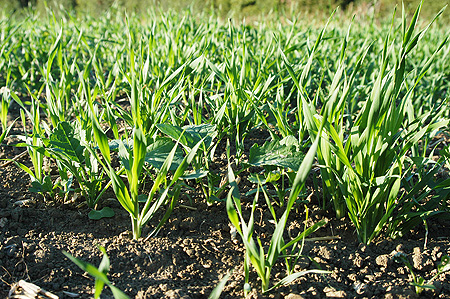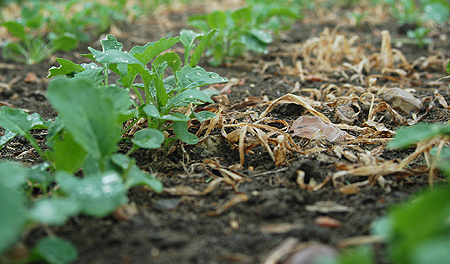
Warm soils and excellent growing conditions continue to delay many oilseed rape growers’ residual propyzamide herbicide applications this season. The conditions have also resulted in continuous germination of competitive volunteer cereals, especially where crops have been established by min-till.
Since propyzamide may take longer to achieve control in mild conditions, growers need to be adding a specific graminicide tank mix for the fast removal of volunteer cereals, according to Syngenta Technical Manager, Chris Charnock. "Volunteer cereals will compromise autumn establishment by competing strongly for nutrients, water and, as day-length shortens, for all important light.
"The inclusion of Fusilade Max in the tank mix will ensure the rapid removal of existing volunteers (above) and provide the best possible platform for residual control of grass and broad leaved weeds with the propyzamide."
Most agronomists advocate holding off propyzamide application until soils cool to below 10C, which could see some treatments delayed beyond November. This could compound the problem of tackling larger, well established volunteer cereals. "There is good flexibility in the Fusilade Max application rate, up to 1.0 l/ha, where growers are facing larger volunteer cereals and grass weeds," advises Mr Charnock.

Mr Charnock reminds growers that, for black-grass resistance management, only one application of an individual graminicide active ingredient is permitted per season in oilseed rape. "For growers who haven’t yet used their Fusilade Max application, it can work very effectively in tank mix with propyzamide," he adds. The addition of Fusilade Max to propyzamide can also improve the consistency of black-grass and brome control.
The vigorous oilseed rape crop canopy this season also poses an additional challenge for sprayer operators, aiming to get soil-acting residual herbicides to their target. "The use of angled nozzles and appropriate water volumes can enable operators to hit grass weeds and volunteers sheltered under the oilseed rape canopy with Fusilade Max, and get a far greater proportion of the propyzamide spray onto the soil surface."
Where volunteer cereal populations are exceptionally thick, Mr Charnock highlights an initial application of Fusilade Max will beneficially remove the competition, and open up access to the soil surface for follow-up propyzamide sprays.
